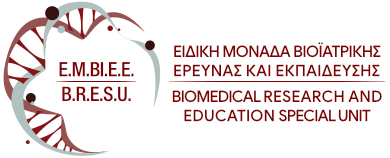Main scope of the CRU is to run phase I clinical trials, studies of bioequivalence and/or therapeutic equivalence, pharmaco-vigilance and pharmaco-epidemiology studies. It shall also offer sub-specialty training to doctors who hold the Certificate of Specialisation in Clinical Pharmacology. More specifically, the CRU activities shall include the following:
- Running phase I clinical trials aiming at specifying the correct dosing for treatments whilst in parallel assessing the safety profile of new drugs. Phase I clinical trials do not involve patients, but only healthy volunteers, and their implementation follows strict processes with main concern the safety of trial participants while they insured by fees paid from the pharmaceutical company which sponsors the study.
- Running bioequivalence studies in a way similar to phase I clinical trials.
- Offering an consulting service to doctors from all disciplines so as to select the optimal treatment, having taken into account the clinical status of the patient, in order to better manage drug regimens and to avoid excessive prescribing. Such advice shall be offered on the written request of the responsible physician and shall be allied with evidence-based medicine.
- Analysing biological specimens to determine drug concentrations in order to individualise dosing for patients.
- Organising a reference centre for drug side-effects, creating registry and producing retrospective case analyses.
- Promoting methods for the control of the risks from hazardous interactions between drugs or other factors and for avoiding over-dosing or under-dosing, as well as for other procedures so as to reduce pharmaceutical errors.
- Promoting rational methods for the control of costs whilst improving therapy practice and clinical outcomes for patients.
- Providing diagnostic and therapeutic support in poisoning cases.
The CRU shall provide a portfolio of high-quality services to the Hellenic National Health Service, to the health-related regulators (e.g. the Ministry of Health, the National Organisation for Medicines – EOF, the European Medicines Agency – EMA, etc.), to social security providers as well as to Hellenic and international pharmaceutical industry, on matters relating to the efficacy and safety of drugs with regards to:
- The certification of bioequivalence and/or therapeutic equivalence between essentially identical drugs (genotypes, copies), as well as original medicinal substances, allied with EOF and EMA specifications.
- Testing the pharmacokinetics (absorption, distribution, metabolism, excretion) of pharmaceutical products (systems) for the controlled release of drugs, and products manufactured with the use of nanotechnology, so as they obtain licensing.

